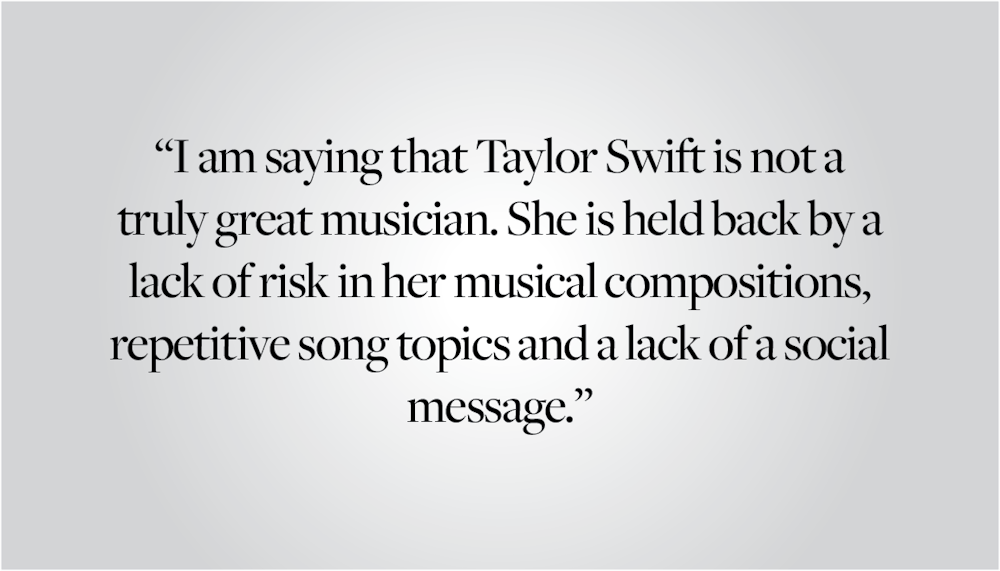With the widespread success of Taylor Swift’s Eras Tour, many are rushing to crown her as the greatest popstar of all time. Obviously, Taylor Swift’s music is good. It’s catchy. It’s a fun listen. Furthermore, she is prolific, having sold albums in record-breaking numbers, maintaining a position as one of the top artists on Spotify and filling stadiums all over the world in her recent Eras Tour. Evidently, she has created a brand to which Swifties are incredibly devoted.
But many musical artists are capable of making catchy, popular and enjoyable music.
What separates a good musician or band from a great one? A truly great musician sets themself apart in ways that transcend selling albums or making popular music. They excel in dimensions that mean more: variety of song topics, experimenting with different sounds and recording methods and making music with a meaningful message. These things have a real social impact, becoming bigger than the music itself, and push forward the development of culture as a whole. For all of Taylor Swift’s success, analyzing her by the criteria I have proposed tells me that she is good, but not great.
Most of Taylor Swift’s songs do not vary much in composition. This prevents her from introducing new sounds that advance modern music, challenging listeners and perhaps even converting skeptics into fans. She has a notably large number of melodies that stay on a single note for long periods. Some may argue that this simplicity allows listeners to focus on the words and the meaning of the song, but I trust that most can understand a song’s message without being distracted by a complex melody. For example, despite Childish Gambino’s “This is America” having many pace and tone changes, surely few listeners miss its strong political message. In fact, the complexity of the song strengthens its message because it forces listeners to pay attention and conveys the changing emotions behind each verse.
Moreover, Taylor Swift’s songs display an unwillingness to try new sounds and producers. For example, Bob Marley — an artist I would consider great —helped create reggae, a new genre fusing soul, R&B, rock, ska and rocksteady. He did so by collaborating with many different producers at different studios. By contrast, many of Swift’s songs were recorded and produced by a single producer, Jack Antonoff. Obviously, this is not inherently bad, but it shows that she was content with proceeding in the same creative direction for a long time. Swift’s creative direction is one that resonates with millions of fans, but part of a great artist’s job is to introduce their fans to new sounds and genres. For instance, an element of the Beatles’ greatness was their innovation on songs like “Helter Skelter,” whose unprecedentedly noisy guitars are sometimes invoked as a precursor for the genre of heavy metal.
Swift has even less variety in song topics than she does in song compositions. Taylor Swift famously writes many songs about breakups. I do not fault her for writing songs about this specific topic — I am sure it is healing for her to sing about them, not to mention the comfort it brings to fans going through similar hardships. However, it is a bit disheartening that a single topic dominates so much of her output, especially a topic that plays it so safe.
From Aretha Franklin’s challenges to sexism and racism to Creedence Clearwater Revival’s songs railing against war and elitism, truly great musicians use their music to speak truth to power and comment on the current state of the world. Music is a powerful tool to make the world a better place. Unfortunately, Taylor Swift’s music does not seek to bring social change or comment on the world. Years ago, she notably said, “I don’t talk about politics because it might influence other people.” She later began to express some political views cautiously, but she still has relatively few songs about social issues, and none of these songs have an explicit message. Moreover, none of her most recent output comes close to touching on social issues. A single Instagram post of hers helped a nonprofit register more than 35,000 new voters – imagine the impact a hit song about voting could have.
To reiterate, I am not saying that Taylor Swift is a bad musician. Her music is extremely well-liked and popular, and it makes many people happy. Rather, I am saying that Swift is not a truly great musician. She is held back by a lack of risk in her musical compositions, repetitive song topics and a lack of a social message. Ultimately, like other good artists, her music serves no purpose outside of being enjoyable to listen to — which is okay.
Benjamin Aizenberg ’26 can be reached at benjamin_aizenberg@brown.edu. Please send responses to this opinion to letters@browndailyherald.com and other op-eds to opinions@browndailyherald.com.





